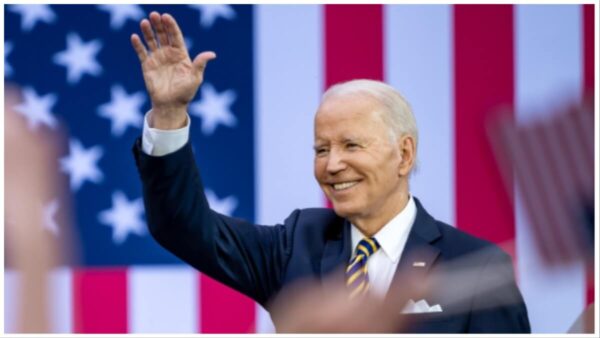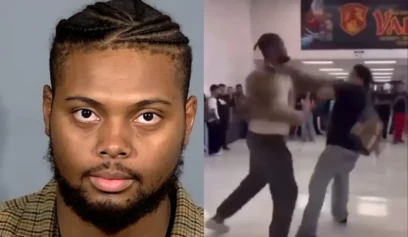As the U.S. presidential election season gains momentum with President Joe Biden trailing former President Donald Trump in polls, there seems to be a growing concern from Biden’s camp that he may be losing support among Arab-American and Muslim voters, as well as Black voters, due to his backing of Israel’s conflict against Hamas in the Gaza Strip.
And a recent move by Biden to deter violence against Palestinians is generating mixed reactions from his supporters. Meanwhile, the president’s position on the conflict has landed him in deep hot water with the voting demographics that helped secure his 2020 win.

Some of the 200,000 Muslim and Arab-American voters in Michigan now plan to send Biden a message during the early voting stages of the 2024 presidential election if he doesn’t support a ceasefire, provide aid to Palestinians and stop funding Israel’s military.
“Joe Biden failed himself. Joe Biden failed the humanity. So, Muslim American community, our message, yes, indeed, on February 27 in Michigan, we are voting uncommitted,” Mohammad Alam, national chair of the American Muslim Political Action Committee, told PBS.
The president issued an executive order on Feb. 1 directed at violence in the West Bank, imposing sanctions on four Israeli settlers who attacked Palestinians.
It noted the high levels of “extremist settler violence, forced displacement of people and villages, and property destruction” was a threat to the stability of the West Bank and Gaza, Israel, and the broader Middle East region and that it also undermined the foreign policy objectives of the United States.
These sanctions against Israelis — the first of their kind issued by the Biden administration — will translate into the freezing of their individual assets and restricting monetary dealings with them.
According to the United Nations Office for the Coordination of Humanitarian Affairs, 370 Palestinians, including 94 children, have been killed, and at least 198 Palestinian households comprising 1,208 people were displaced amid settler violence across the West Bank between October 2023 and January 2024.
The sanctions have targeted David Chai Chasdai, Einan Tanjil, Yinon Levi, and Shalom Zickerman. According to The New York Times, the four men are between 21 and 32 years of age.
The U.S. State Department said Chasdai, 32, led a riot by setting vehicles and buildings on fire, assaulting Palestinian civilians, and causing damage to property in Huwara. This led to the death of a Palestinian civilian.
Tanjil, 21, was involved in assaulting Palestinian farmers and Israeli activists; Zickerman, 32, in assaulting Israeli activists and their vehicles in the West Bank; and Levi, 31, in leading a group of settlers who created an atmosphere of fear in the West Bank, among other intimidation tactics, added the State Department.
In December, the U.S. imposed a visa ban on people involved in violence against Palestinians.
Following the recent executive orders, the Council on American-Islamic Relations (CAIR) — a Muslim civil rights and advocacy organization — called for the Biden administration to end its support for the Israeli government’s war on Gaza.
“It makes no sense for the Biden administration to oppose killing Palestinian civilians in the West Bank while enabling the killing of Palestinian civilians in Gaza,” CAIR said in a statement.
While far-right Israelis denounced the sanctions, many Arabs have called this inadequate. The step of issuing an executive order, though “rare” and “positive,” was not enough, wrote Kenneth Roth, former executive director of the nonprofit Human Rights Watch.
Israel has occupied the West Bank and the Gaza Strip since the 1967 Six-Day War. United Nations officials have reiterated that these occupations are violations of international law, and the de facto annexation can amount to a war crime.
Speaking to Atlanta Black Star, Arun Kumar, former consul general of India to Chicago (2003-2007), observed that this otherwise unprecedented move by Biden was more about “public posturing,”
“This is because the current political scenario is complicated,” Kumar said. “Biden has been cornered and is not in a politically comfortable position now. Be it the Democrats or Republicans, they give impetus to Israel.”
Interestingly, Biden’s executive orders came on a day he was visiting Michigan on his reelection bid in a state that is home to the highest number of Arab Americans.
In January, Arab-American local officials from Michigan said they were furious with Biden’s policies in Gaza, and it could be “detrimental” to his re-election chances. Michigan is a key swing state in presidential elections, with winning outcomes recently being decided by very thin margins.
While historically, Black Christian votes have been crucial in electing Democratic candidates, Biden may fast be losing his support base of Black faith leaders.
In a full-page advertisement in The New York Times, more than 900 Black Christian faith leaders had called for a cease-fire and urged the Biden administration to ensure secure entry of humanitarian assistance for Palestinians and commitment to the peace process. They have also met White House officials to demand that the U.S. should urge Israel to stop killing civilians in Gaza.
Biden’s current stance may affect his electoral support among the Black voters.
African-American writers, leaders, and celebrities have come out in support of Palestine, condemning Israel’s carnage in Gaza. The Associated Press, in an article, said Black Americans saw “the Palestinian struggle in the West Bank and Gaza’ as a reflection of their ‘own fight for racial equality and civil rights.”
Black Lives Matter activists have also repeatedly called for an end to Israel’s occupation in Gaza.
A survey conducted between Oct. 20-25 found that 43 percent of Black Americans supported cease-fire in Gaza, while 24 percent were of the opinion that the U.S. should not be involved in the Israeli-Palestinian conflict.
Meanwhile, Israeli Prime Minister Benjamin Netanyahu has defended the settlers, saying that the Israeli government acts against any Israeli who breaks the law and citing that “exceptional measures are unnecessary.”
Netanyahu said, in a statement, “the overwhelming majority of residents in Judea and Samaria are law-abiding citizens, many of whom are currently fighting — as conscripts and reservists — to defend Israel.”
The U.S. government continues to try to strike a delicate balance between its support of Israel and its concern for Palestinians’ safety.
On Feb. 13, the Senate passed a $95 billion aid package that, while it has nearly two-thirds allocated toward helping Ukraine in its war against Russia, would also provide $14 billion for Israel in its war against Hamas and a portion of $9.1 billion for humanitarian assistance in Gaza and the West Bank. The bill is expected to face steep opposition from House Republicans.
Ritwika Mitra is an independent journalist based in India. She writes on gender, climate change, hunger, poverty and politics.


